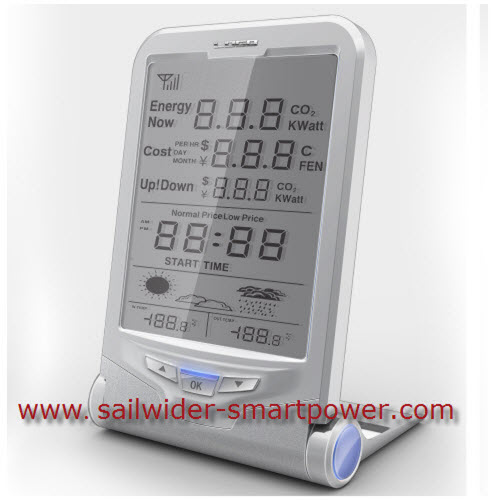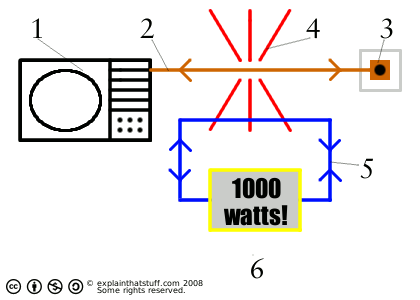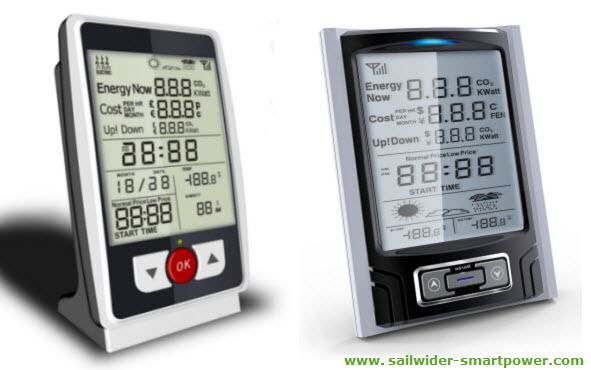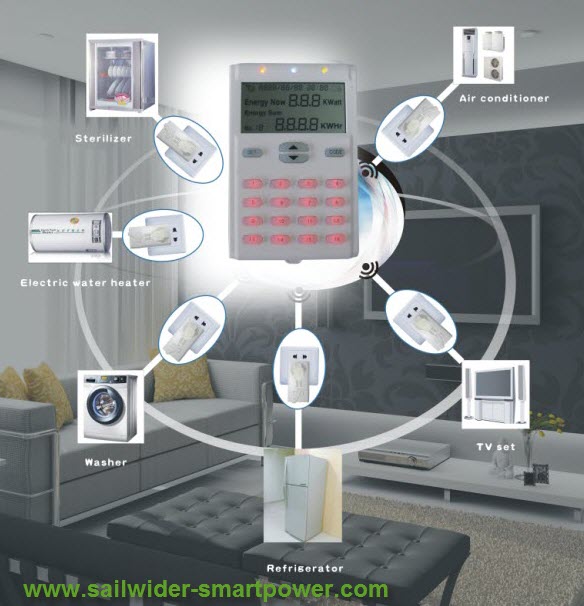The Energy Saving Trust
estimates that households in the
UK waste around eight per cent
of their electricity bill on
standby power – that’s about £40
a year for an average household.
In addition, £170 million a year
is wasted through leaving lights
on in unused rooms.
Some energy suppliers provide
free monitors with selected
tariffs; ask your supplier for
more information. Otherwise
there are a number of retailers
selling monitors with different
functions. Sailwider-SmartPower
is a
Manufacturer and Developer of
Electricity Monitor and Control
System.

Generally, a
home
energy
monitor
measures
energy
usage in kilowatt-hours (kWh),
and electric companies bill
based on kWh used. The kilowatt
hour is a measure of power, or
watts, multiplied by an amount
of time. Using 1,000 watts for
one hour is one kilowatt.
Any item in a house that uses
energy
adds to the overall kilowatt
usage of the household. Large
appliances can add significant
loads to the
energy
usage of a house, which will
drive up total
energy
costs. A
home
energy
monitor
can be used to easily track down
devices and appliances that are
adding unnecessary kilowatt
hours to the overall household
energy
usage.
An
individual
home
energy
monitor
can be used between a device and
the power outlet to measure the
amount of
energy
that device is using. This is
especially helpful for devices
which spend time in standby or
sleep mode, as the devices can
still use a significant amount
of
energy while plugged in
but turned off. Using a
home
energy
monitor
that tracks individual device
usage can help a homeowner find
which devices are better to
unplug after use instead of
leaving them plugged in and on
standby.
There are also
home
energy
monitors which
monitor
the entire house instead of
individual appliances. These are
helpful to get a picture of what
the real-time
energy
use of an entire house is. Like
the individual
energy
monitors, these can be used to
determine the kWh usage of
individual appliances and
devices. If everything in the
house that uses electricity is
turned off, individual
appliances can be turned on and
the change in
energy
use can be observed on the whole
home
energy
monitor.
By looking at your smart electricity monitor display, you can see how much electricity your house is using. Over time, you will get used to seeing how little electricity your house needs, and can tell when lights have been left on, or when other appliances have been left on by accident, which may be wasting electricity. You can then turn these energy wasting appliances off, saving you money, reducing your electricity consumption, and helping the environment by reducing your carbon footprint.
How energy monitors work
- You switch
on your
appliance.
- Alternating
current (AC)
carries
electrical
energy into it.
- The AC
current flows
back and forth
along the power
cable between
the power outlet
and your
appliance.
- As the
current changes,
it creates a
magnetic field
all around the
cable.
- Put your
energy monitor's
probe near the
cable and the
magnetic field
causes a
secondary
alternating
current to flow
inside it.
- Your energy
monitor measures
the size of this
secondary
current and
either converts
it into a
measurement in
watts (W) or
calculates the
running cost per
hour.
Electricity is having a difficult time—or, rather, making it has never been more tricky. Oil and gas are rapidly running out, coal's dirty, wind power and solar panels still aren't completely competitive, nuclear worries people. Add to that the difficult problem of global warming (the way Earth is slowly heating because of carbon dioxide produced when we consume energy) and you can see we're in a bit of bother. If you're troubled by the high cost of energy, or by the effect people are having on the planet, why not start using energy more wisely? You can drive more efficiently, for example, switch off your air-con, or turn down your room thermostat a degree or two. Another good thing you can do is try to use energy-efficient lamps and appliances that consume less electricity. If you've no idea how much electricity you're using, that's where electrical energy monitors can help!
|
 |
Wireless electricity energy
monitor
A
wireless smart electricity
monitor is a device used to
monitor electricity consumption,
adopting the wireless technology. In a
typical wireless electricity
monitor configuration, a unit
that measures energy output is
connected to the electricity
meter in a home meter box, and
that unit transmits information
about energy consumption
wirelessly to a display unit.
The display unit shows the
amount of power being used, the
cost of the power and the
greenhouse gas emissions caused
by the electricity being
consumed. Some units also
display other information such
as ambient temperature and
humidity.
Wireless electricity monitors
are easier to use than wired
electricity monitors because
they allow users to place the
display unit anywhere in their
homes. This way, users can
frequently check the amount of
energy being used without having
to walk to a meter or run wires
through their homes. Wireless
electricity monitors are usually
battery-operated, though some
units have direct current (DC)
adapters that enable them to be
plugged into wall power.
Most people who use a wireless
electricity monitor do so to
reduce energy consumption.
Having a constant visual
reminder of how much energy is
being used at any given time,
how much the energy costs and
how much of an effect the energy
use has on the environment can
help people stay mindful of
their energy use and remind them
to turn off appliances when they
aren’t using them. The monitors
can also be used to figure out
how much energy particular
machines and appliances are
consuming so users can determine
how they can best reduce their
energy use.
Sometimes, a wireless
electricity monitor only shows
how much energy is currently
being used, but many wireless
electricity monitors also store
usage data and enable users to
review their daily, weekly and
monthly energy use. This
tracking ability can help users
review how they’re using
electricity, stay motivated to
continue using less electricity
and develop strategies for
reducing consumption. A wireless
electricity monitor is not very
expensive, and many users say
they recoup the cost of the
monitor in just a month or two
by using less energy.
Some wireless electricity
monitors also have the ability
to connect to a personal
computer. The transmitter unit
can stream energy usage data to
a device connected to the
computer, usually through a
universal serial bus (USB) port.
Computer software that comes
with the data receiver typically
enables detailed electricity
tracking and reporting.
Sailwider-SmartPower Electricity Monitors
The basic figures contained
within a monthly or quarterly
electricity bill do not give you
much information as to where
your electricity is going - they
just tell you how much you have
used in total during that period
and how much totally you need to
pay. Therefore it is well worth
considering purchasing an
electricity usage monitor and
using it to see exactly where
all your hard-earned money is
going.
One great way to find out how
much electricity each of your
household appliances and
electronic devices uses is with
a wireless electricity
power/energy monitor, which
shows you in real time exactly
how much money your total home
or office electricity usage is
costing you. These monitors can
help you reduce your electricity
consumption by as much as 20%
simply by showing you what you
are using.
Sailwider-SmartPower is a
developer and manufacturer of
wireless electricity power monitor and
controlling system.

Most electricity energy monitors
in the market are uni-directional
(1-way) only, that means you can
only get energy consumption
information from the monitor.
The
bi-directional (2-way)
wireless electricity power monitoring and
control system
from Sailwider-SmartPower makes
the user not only able to
monitor the electricity usage,
but also can easily remote
control the connected electrical
appliances wirelessly, providing
great convenience to electricity
efficiency management.
Sailwider-SmartPower adopts
433MHz technology to realize the
wireless transmission between
the display unit and the
transmitters.
 |




